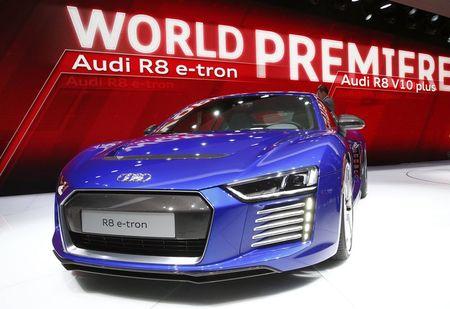BERLIN/GENEVA - German carmakers are shifting their focus toward high-end electric vehicles such as the Audi R8 e-tron and away from cheap city cars, in the latest effort to revive environmentally-friendly but unpopular zero-emission vehicles.
At the Geneva auto show, Audi unveiled an emission-free version of its 165,000-euro ($184,619) R8 that can drive 450 kilometers (280 miles) before needing to recharge, which takes less than two hours.
It marks a new departure for Audi, which has agonized over whether to launch a range of electric vehicles.
Battery-powered cars have failed to live up to their initial hype, with drivers put off by the slow rollout of recharging stations, and limited range -- despite generous sales incentives in some markets.
Because the batteries, cabling and cooling systems for electric cars cost more than a conventional combustion engine, electric vehicles have struggled to gain widespread acceptance among price-sensitive customers, particularly if the same model is available cheaper with a more conventional powertrain.
However, U.S. maker Tesla, which produces cars with a price starting at 50,000 pounds ($77,000) has had notable success with electric cars.
A premium price-tag enables the carmaker to install a larger battery which would be uneconomical in a cheap car, giving the vehicle a range of more than 400 kilometers on a single charge. In smaller electric cars, the operating range is limited to around 100 kilometers until costs come down.
In Geneva, Daimler CEO Dieter Zetsche said one of the reasons electric cars had failed to gain traction was because they tended to be in the cheaper vehicle segments.
“As proven by Tesla, there can be a market at the other side of the range as well. If that is a possibility, we are investigating," Zetsche said, hinting the company's luxury Mercedes brand may be working on an electric limousine.
The electric car industry may still gain traction, but it will take time, Zetsche added. "This is an industry where the cycle takes 14 or 21 years to become really strong and relevant,” he told reporters.
For electric cars to gain widespread acceptance, the price of batteries needs to fall below $100 per kilowatt hour (kWh), Ulrich Hackenberg, head of research and development at Audi, told Reuters on the sidelines of a Volkswagen event in Geneva. Hackenberg declined to say where battery prices were currently.
Bernstein Research analysts estimate electric vehicle battery pack costs are around $400 per kWh today, and may drop to $180 by 2025.
Treading carefully
Audi, the flagship brand of Volkswagen , has been reluctant to embrace electric cars, arguing it was better to make diesel cars cleaner or focus on hybrids that combine a combustion engine with battery power.
It flirted with an electric R8 sports car in 2009, promising a thrilling performance but an underwhelming range of 134 miles. It wasn't enough, and Audi dropped the concept in 2012, the year rival Tesla's Model S came out with double the range.
The new R8 e-tron's battery capacity, however, has almost doubled to 92 kWh from 49 kWh in the aborted 2012 model, a source close the matter said.
That has helped more than double the range of the carbon-fiber vehicle which surges to 100 kilometers an hour in 3.9 seconds, compared with 3.2 seconds for the 540-horsepower model.
Audi may also launch two battery-powered serial models by 2018, a sports car and a sports-activity vehicle with over 500 km of range to rival Tesla's upcoming Model X SUV, two company sources told Reuters.
However, analysts said Audi was treading cautiously, not least because it only plans to build the R8 e-tron by request.
"Such projects are no practicable means to leverage electric driving over the short term," said PwC analyst Christoph Stuermer. "They only help minimize the business risk."
Sales of the R8 e-tron probably won't exceed 100 a year through 2022, research firm IHS Automotive forecast. By comparison, IHS expects deliveries of Tesla's Model S to grow 14 percent to 41,396 cars by 2022 from 36,364 this year.
Analysts said the R8 e-tron, Audi's first all-electric production car, could act as a "halo" product to draw customers to its showrooms and help it gauge interest in more battery-powered and hybridized cars.
While Audi has incurred a three-digit million-euro cost to develop the model, there will be no fixed production costs because it will be custom-made, one company source said.
Nonetheless, Audi views the project as a step change.
"It's beyond any question" that battery cars have become more important to Audi," Chief Executive Rupert Stadler told Reuters in January. "I'm very happy that (R&D boss) Ulrich Hackenberg is stepping up the pace on electric cars."




















































